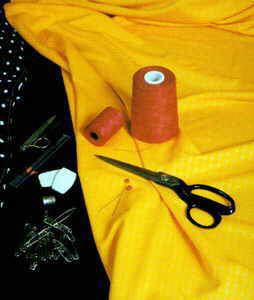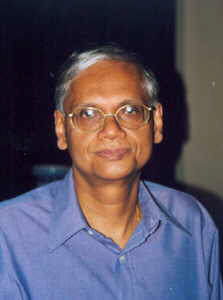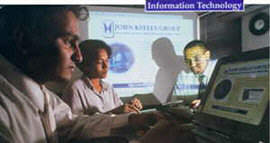 INDUSTRY AND TRADE, INDUSTRY AND TRADE,
A MAIN BASE FOR INDUSTRIAL GOODS |
Thirty years ago, Sri Lanka was known as a country, which only exported agricultural products to the international markets. Its tea was the main export product at that time, but things have changed dramatically in this little island over the last two decades. From agricultural exports the country has emerged as a main base for industrial goods today.
The country has a cabinet ministry, which is responsible for developing the industrial sector. Under this Ministry there is a main body that promotes foreign investments called the Board of Investment (BOI). Basically the Ministry's main responsibility is to look after the entire industrial sector and textiles in particular. If you look at the Sri Lankan economy as a whole, 52% of its foreign earnings come from the export of garments. The apparel exporter industry is represented by the The Apparel Export Association, which recorded phenomenal growth and development during the past two decades primarily due to the bilateral trading arrangements of the Textile accord, and also to its well-defined strategy.

Recently Sri Lanka concluded an agreement with the European Union to allow for some of the competitive restrictions that applied to Sri Lankan goods, to be removed; so there is a very considerable potential for development of the apparel industry towards exporting garments into the EU. Last year the manufacturing sector grew by about 9%, and the Services sector inclusive of Banks and Insurance Companies grew by about 8%.
The Board Of Investment is like a "One stop Shop" that provides all kinds of support services for investors. The BOI also has statutory power to exempt investors from three major legislative regimes that would otherwise apply. One is Inland Revenue, the second is Exchange Control and the third is Customs. The removal of these legislative regimes is applied to foreign investments that have BOI approval, relieving for a major part of the process of establishing any type of business in the country. These are just a few of the many incentives that the Ministry of Industrial Development coordinates in order to attract and facilitate foreign investment to the country" says the Minister of Constitutional Affairs, Industrial Development and Deputy Minister of Finance and Planning, Professor G. L. Peiris of the Democratic Socialist Republic of Sri Lanka. A well-read scholar, Prof. Peiris is also the former vice chancellor of the University of Colombo.
Sri Lanka has several large industrial zones: the first being the Katunayake zone, which is in the vicinity of the International Airport, the second in the deep South which is called Koggala and the third is Biyagama in the Gampaha district which is the most populated one of the regions. The Industrial Development Ministry has embarked on a vigorous promotional campaign to promote foreign investments. The Board of Investments (BOI) has adopted the policy of sending out promotional missions to different countries where there is a need for active work to be done. In addition, large Sri Lankan missions abroad have employed officers who are appointed by the Minister of Trade and Commerce. The Officer has diplomatic status and is part of the Sri Lanka Mission in a foreign capital but there is a specific focus and orientation with regard to his or her duties, which are specifically concerned with trade, commerce, investment and entrepreneurship. This is an on going procedure and from time to time this work is supplemented by high profile delegations going from Sri Lanka.
The minister recently undertook a promotion visit to the USA and a few of the Scandinavian countries. "The most encouraging part of these projects' outcome was that the private sector's representatives who accompanied us as part of the delegation and were able to conclude a series of very useful agreements with their counterparts in the countries that we visited. For example in Gothenburg, Sweden and Copenhagen, many of the companies in the Information Technology field were able to enter into firm partnership agreements and other sorts of arrangements of that nature with the companies situated in the same sectors in those countries.'

The total value of Sri Lanka's exports to the United States last year was USD 2 billion, of which 1.4 billion came from the export of garments - clothes. The non-traditional exports, and in particular leather goods and sports goods, are doing extremely well. Sri Lanka’s leaders and most respected scholars also see a bright future for the sector, Prof. Peiris says:
"In addition to the traditional commodities and traditional markets, we are spreading ourselves out and searching for new markets. For example, in New Zealand many of the sails in Auckland Harbour have been manufactured in Sri Lanka. Most of the shirts that are bought at Marks and Spencer Stores in England are made in Sri Lanka. We have a highly disciplined and motivated labour force. We have a particular advantage in regards to our financial, banking, legal and administrative systems, which have been westernised. Sri Lanka has a very high literacy rate - 91% that is very rare in South Asia, and we are very proud of it. In what Human Resources Development is concerned, Sri Lanka has a Life Expectancy of about 73 which is comparable with most countries in Europe. We have a very mature political system; people have been changing governments peacefully when elections. Our people have been voting since 1931. We have Trade Unions, Social Security Systems, and Poverty Alleviation programs. This stability is helpful and should appeal to foreign investors and firms," says the Minister.
Sri Lanka has just recently entered into a free trade agreement with its huge neighbour- India. The Sri Lankan Government says that the agreement is an ideal opportunity for foreign investors to break into lucrative Indian market through Sri Lanka by taking advantage of the free trade agreement. "The future of the Free Trade Agreement is very bright, I would describe it as a landmark development, we use this argument whenever we travel abroad because we know this is so and just the beginning of it. We are in a position to say with justification that Sri Lanka should no longer be seen just as a market of 18 million people. On the contrary, it is a gateway, a point of entry into the entire Indian sub-continent. That is how we see the Free Trade Agreement with India. We don't regard the relationship as antagonistic in any way. We don't perceive India as a rival or competitor, but rather as a partner, and we are working together to achieve growth and development for both nations. In relation to Sri Lanka India obviously has the advantage of size, but size can be a double edged weapon and Sri Lanka has the advantage of a much higher per capita income, it is roughly twice that of India," claims Mr. Peiris. In the industrial sector, Sri Lanka has the competence, expertise, skill and a very supportive and amenable climate of public opinion. "There is optimism in our hearts and minds and there is hope and expectation, the country has enormous potential, it has a great deal to offer. Even today despite the war, the economy is growing by almost 5%. That demonstrates the resilience of our economy. We are proud of that achievement, and I think an objective appraisal of the country and its strengths will leave no room for doubt in the minds of investors and that the country is worth looking at seriously," says the Ministe.
Some Sri Lankan companies within the industrial sector have done extremely well to keep the country's economy afloat and growing. The achievements of companies like John Keells Holdings Limited (JKH) are quite remarkable and worth mentioning indeed. From modest beginnings as a produce and share broking company in the early 1870s, John Keells has evolved into the country's premier conglomerate in Sri Lanka, the single largest quoted company on the Colombo Stock Exchange and a benchmark of the economy. Over the years the company has made significant investments in areas such as Food & Beverages, Tourism, Transportation, Plantations, and most recently in Ports and IT. Its business also spans in Financial Services and domestic & international trade.

However, the success of John Keells could be particularly attributed to the endeavour of past and present management teams, to continually reinvent the group in order to pursue growth in various areas. Thus, focus has shifted from commodity brokers in the 60s, Tourism and Cargo transportation in the 70s, Food and beverages in the 80s and Plantations in the early 90s, to our present thrust sectors, Infrastructure and IT. During the last financial year, JKH reported gross revenues of Rs12 bn (US$ 146 mn) and a net profit of Rs780 mn (US$10 mn). It has registered a 24% compound annual growth rate in earnings over the past 5 years. 'There is tremendous potential for tourism in Sri Lanka, if not for the present security conditions and the negative publicity. At present, we have good tourism seasons in spurts, in the absence of any major security incidents. However, we have taken all necessary steps to ensure that we are in an excellent position to reap the best from a possible improvement in the situation, Chairman of John Keells Holdings Ltd, Vivendra Lintotawela says.
The company that owns a chain of hotels in Sri Lanka and in the Maldives is also the largest inbound tour operator in Sri Lanka. The IT is another thrust area where the company has made significant investments, particularly over the past few years. John Keells Computer Services, the software services company, increased its cadres to over 400 technicians from just about 150 in the last year, and is now ready to compete in the rapidly changing global business environment. The main offering of the company is the concept of "offshore development centres" while it also seeks to take advantage from being appointed as an Oracle solutions partner last year. | "At present we have set up development centres for Emirates and P&O in the UK, while we are also negotiating contracts with NTT of Japan, Sri Lankan Airlines and a few firms in Norway and other Scandinavian countries. The potential here for John Keells is immense considering the sizeable difference in revenue per technician compared to regional IT giants especially in India. Of course Sri Lanka was relatively late in moving into the industry unlike India, but we hope that our recent efforts to develop the infrastructure and backbone for a good IT company with an emphasis on training should help narrow this gap," Mr. Lintotawela says. "Given the need for more trained IT professionals, two years ago the company launched the John Keells Institute of Information Technology in collaboration with TATA InfoTech of India. John Keells is a group of professionals managed by professionals. Enhancing shareholder value is its primary corporate goal, while performing fiduciary duties to all other stakeholders as well. "We take great pains to ensure that our internal reporting and appraisal system reflects our primary goal and that every employee in every revenue, cost and profit centre recognises its importance," he says. The confident chairman of JKH is of the opinion that despite the internal problems and bad publicity, the country has great potential for foreign direct investments. Sri Lanka still offers one of the best investment climates in South Asia. The country is ideally located as a regional trading hub with strategic access to the Indian market while the Indo-Lanka free trade agreement strengthens this further. The country has a highly literate and cost-competitive labour force, solid infrastructure with the increased insolvent of the private sector in it, attractive investment laws and the continued de-regulation of capital markets. "Foreign investors directly own about 36% of the issued shares of John Keells, there is also fairly substantial foreign investment involved in a number of our projects. For instance, although we are the single largest shareholders in the Queen Elizabeth Quay development project, over 58% of the US$240 mn foreign investors held project. This is yet another success story for us, as well as the country. We also have a 7% stake in a high dividend yielding power project, where the balance is funded by foreign investment. In addition, our group companies have many joint ventures and strategic alliances with numerous international names. To date, we have not had a single unhappy partner," he says. John Keells has already been ranked as its top company. During my term as Chairman, I hope to see it evolving into the truly global success story it aspires to be, he concludes.
While Sri Lankan made garments/clothes adorned in the high-fashion western clothing shops, the local fashion market is also thriving. This has made an opportunity for local entrepreneurs to set up wealthy clothing outlets in and around Colombo. The House of Fashions - a clothing company is one of the most successful ventures. Owned by Husband and wife duo, Preethi and Neelamani Jayawardena, House of Fashions is a trendsetter within the fashion industry in the country. The shop was first started nine years ago at a 20 x 20 feet premise. This is from where the organization has grown to what it is today - a Singapore styled high rising building. The owners attribute the success to market identification. " We cater broadly to three groups, the affluent, the middle and the lower middle classes. My wife and I studied the market and priced our products to cater to them. All the products that were marketed by our departmental store were, therefore, targeted toward these groups at the highest possible quality and at a relevant price that no other establishment in Sri Lanka was able to match,' says husband - Preethi Jayawardena. The House of Fashions also created a new shopping style in the country - a 24 hour shopping facility during two major festivals - Christmas and New Year." We are the first to open a garments retailing departmental store in Sri Lanka with quality goods, which combined with affordable pricing and good customer relations has contributed to our success. It was our mutual vision, as husband and wife, backed by hard work, planned strategies, constant discussions and the strong support we have always unreservedly extended to each other, that has made House of Fashion what it is today," says Neelamani Jayawardena.
The company is now planning to further expand its business. Going offshore in one of the major plans. "We also hope to open branches outside Sri Lanka, initially in the U.K., and later in other countries," Jayawardena said.
However, the duo prefers to continue their business on their own, rather than going into joint ventures. House of Fashions will soon introduce a range of designer label clothing.
Referring to competition the duo mentioned that there has not been any threat from other similar businesses. At present, the company employs 198 male employees. Since the shop is opened till 8.30 in the night, the company prefers to employ male workers.

 MODELS MODELS |
In three years time the company plans to go in for major changes such as a new interior. The retailing outlet in Colombo managed by a former seaman and teacher duo has contributed much to the growth of the garment sector in the country through their venture. "Our success has been based upon our customers and no matter what the economic situation that prevails in the country we try our level best to keep our prices reasonable. We cut down on our overheads to enable our customers to get maximum benefits. Staff welfare has also contributed. Our employees are paid well, given incentive payments, bonuses. They also receive free food, lodging facilities, and medical cover. Their grievances are discussed and looked into by us and as a result we get excellent service in return," the confident couple said.
Sri Lanka has a large network of 12 Export Processing Zones where foreign investors set up industries and manufacturing plants. The Board of Investment (BOI), the arm that promotes foreign investment in the country, manages the Zones.
In all the zones, a separate office is set up in order to provide all necessary services to the investors and at the same time take care of the workers' welfare aspects. These offices come under the Free Trade Economic Zones and it is not engaged in promoting investments. The BOI offers tax benefits on imports, exports and tax holidays for foreign investors, the best concessions in South Asia.
At present, Korea is the largest investor in Sri Lanka, and European countries such as the UK, Germany, France and Australia are the next big players in Sri Lanka's investment sector.
India has also substantially invested in various manufacturing projects, but Sri Lanka expects that India will play a more focussed role in the future following the Indo-Lanka Free Trade Agreement signed last year. Indian businessmen find that investing in Sri Lanka is convenient as there are no tariff barriers in Sri Lanka and also because of the good labour resources. The truth about Sri Lanka is that it has a war. But, despite all the problems, its economy is moving forward. The trade representatives here feel that if not for the war there will be a tremendous progress in the economy as a third world country. The war zone is not developed but in the border areas, there are industries being developed. Recently a company opened in Vavuniya at the border where the war is raging. This indicates that the investors are prepared to take the risk despite the war.
As a country whose economy is heavily dependent on its exports, Sri Lanka has again achieved many milestones to be the largest exporter of tea and many other products.
The country has a government institution - Export Development Board of Sri Lanka (EDB), which is dedicated to promoting exports. Its main focus is on exports and trade development. The range of export items include agricultural products, plantation products that cover tea, rubber and coconut including plantation products and also other agricultural export crops such as spices, fresh fruit and vegetables, cut flowers and foliage. The other sector, which has a great potential for development is the fisheries sector. Though the country exports a variety of fish such as lobster and crabs to niche markets: Japan and Singapore.
The EDB's priority is the promotion of exports in the industrial products: garments, gems and electronic items, toys, soft toys, ceramic, foot wear and leather products.
The EDB is also encouraging entrepreneurs to get into e-commerce so that they could get used to the Internet and develop their own export developing market. The IT sector has been one of the main focuses of the government, and in the recent budget software has been made a priority sector. The EDB has over the years had a fairly significant catalytic role. It employs 310 persons. The funding comes through the government plus access on imports. In the future, the EDB plans to get more involved in development work in the regions and develop enterprises in the small and medium sector. As far as the industrial exports are concerned, ceramics is one of the major export items of Sri Lanka. Its designer label tableware, tea/coffee sets and floor tiles are world famous and acclaimed by many foreign admirers. Ceramic industry is also one of the major foreign exchange earners in the country. A well-managed Dankotuwa Porcelain Ltd formed in 1984, 'has been at the forefront of the ceramic industry in the country,' says its Chairman Mr. Sunil G. Wijesinha.

In fact, its products adorned the tables at the Oscar Awards night for three times. With the beginning of exports, the company became a successful venture in early 90s, with many strong customer-base in Europe. Later the company was privatised and a Japanese company took a 50 percent stake. With the changes in the company, it began to export to a large number of countries. However, the competition is tougher today due new comers from East European and Asian countries entering into the market. But, the company is more concerned on quality goods than producing cheaper products. The company recently acquired new technology from Germany in order to further increase quality of its products, and expand the product range into a new line. The USA is the biggest market for Dankotuwa Porcelain, and is looking for new buyers in foreign markets, especially in Europe.
Though it's a small country it has a much more international outlook than larger countries. Therefore investors or foreign buyers have found it very convenient to interact and deal with Sri Lankan business partners. Sri Lanka is no longer a country that produces low-cost products. The industries in Sri Lanka are well oriented and managed; they produce or manufacture high quality products, which are quite similar to those in Europe. The industrial sector wants the international buyers to recognise and remember the country as a base, which manufacture high quality, well-priced products. |

